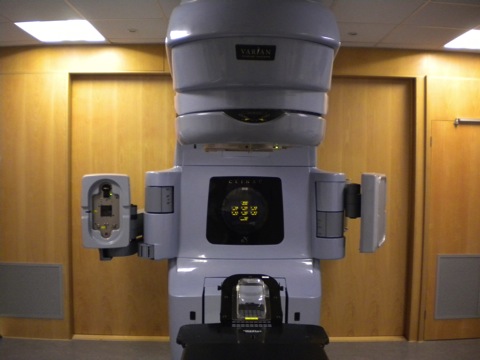
Radiation therapy is the medical process by which ionizing radiation is used for the treatment of cancer in order to kill or restrict malignant cells, excess growth of which is the major cause for tumors and cancer. This therapy is basically a part of the curative treatment done on patients when the cancer has not spread and is contained on one particular part of the body and also to prevent recurrence of tumors after surgery has been done. Radiation therapy is primarily applied to patients dealing with cancerous tumors as this therapy has the capability of limiting cell growth with the help of ionizing radiation which destroys DNA of the harmful tissues which leads to death.
Though radiation therapy is not painful as such, but it does have some side effects which are mostly limited to the part of the body where the treatment has been done. The advanced radiation therapy has set out as an aim to reduce the side effects and assist the patients in comprehending and dealing with the ones that are inevitable. Following are the ways which help patients to deal with the side effects of radiation therapy in an effective and efficient way.
Communicate with your doctor
Firstly it’s very essential for you to communicate with your doctor and understand all the common side effects of the therapy which are possible like fever, dizziness, skin irritation, etc. Also know about the side effects in the area you have been treated especially chest, brain and head. You can also ask your doctor about the National Cancer Institute or look online for clinical trials. Be sure to sign consent forms before commencing clinical trial as these forms contain details about the medications and the possible risks. Make sure you ask your physician about the latest ways for delivering radiation to your body and drugs that safeguard the healthy cells in your body from being destroyed. For the treatment in the neck or head, contact your dentist prior to your therapy and also stay in touch with him later as the treatment in these areas may affect your teeth. All this helps in knowing more about your condition as knowledge about any symptom is essential for its cure.
Take rest
As fatigue is one of the most common side effects of radiation therapy, remember to take adequate rest. Get proper sleep and keep yourself as healthy as possible. Try and take short naps after regular intervals as this will help your body to re-energize and will minimize the chances of fatigue. Longer naps of more than 7 hours leads to your body mechanism slowing down. It makes one lazy. Hence, it should be avoided. Moreover, you should have a fix time for rest and sleep.
Keep a daily regime
Consult your doctor and include in your lifestyle an exercise regime. This will not only facilitate to an increase in your stamina but will also be curative to deal with weakness of your body. Keep your exercise program light but effective so that it makes you healthy and gives you adequate strength to aid you in carrying out your daily activity with ease. Also make sure your exercise regime is well placed according to your food intake regime. One should only exercise after 4 hours of having a meal.
Check for anemia
If you witness excessive fatigue or weakness, then you should immediately check with your doctor for anemia. Though there is a less chance for a patient to get anemia but it’s advisable if you take prior precautions when you are suffering from frequent fatigue and weakness. Ask your doctor to recommend some good and effective medication that will increase the growth of your red blood cells as many healthy cells are damaged by high doses of radiation which though aims at killing cancer cells but sometimes affects healthy cells in the treatment area in a negative way.
Check for skin problems
The problem of skin irritation which includes dryness, blistering and itchiness is often seen among people who undergo radiation therapy, so to avoid the problem from growing further you should stay away from sun as much as evitable. There are few more precautionary measures which you should take to prevent additional problems like staying away from products like perfumes, alcohol or dyes content in them and also avoiding wearing tight fitting apparels. You can also ask your doctor to prescribe you certain lotions or gels which will aid in reducing the skin irritation
Change your diet
For people who go through radiation treatment on the chest or stomach area, special focus should be made on what you are eating. Reorganize your diet by preventing spicy foods or foods rich in fiber. Loss of appetite is a common side effect seen which leads to fatigue and therefore leads to lack in nutrition. As strength is required a lot during cancer treatment, special attention is to be given to increase the nutrient content in your body. If you are able to eat few meals a day, try and increase your calorie intake by adding food with high calories like butter and cheese. You can also add up food rich in protein or healthy powders.
Look for hair loss
Hair loss as a side effect is only seen depending on the kind of cancer you have. Hair loss happens only on the area where treatment has been done and not all over. For example: if you have undergone therapy on your pelvis i.e., the hip portion, then you will not suffer hair loss on your head but if your treatment has been done on your neck or head area, then there is a high probability that you will suffer hair loss. This side effect is not permanent as in most cases the hair grow back.




